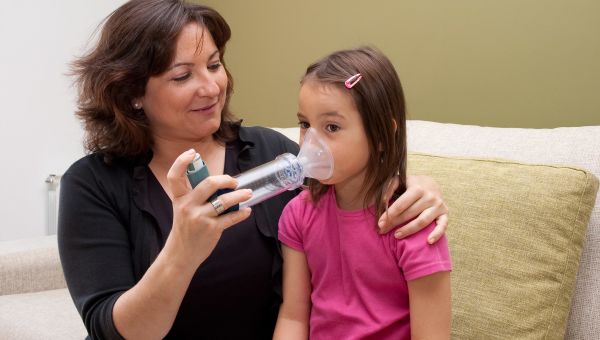6 ways to protect kids with asthma from EV-D68
Learn about the symptoms of this infection and what it means for kids with asthma.
Updated on October 25, 2022

Getting some form of enterovirus is common for many children in the United States during the summer and fall. These viruses can cause a range of symptoms, like coughing, sneezing, runny nose, and fever.
One particular enterovirus (Enterovirus D68, also called EV-D68) has proven much more severe, especially for kids with asthma. Outbreaks of EV-D68 have occurred in… Show More
Getting some form of enterovirus is common for many children in the United States during the summer and fall. These viruses can cause a range of symptoms, like coughing, sneezing, runny nose, and fever.
One particular enterovirus (Enterovirus D68, also called EV-D68) has proven much more severe, especially for kids with asthma. Outbreaks of EV-D68 have occurred in 2014, 2016, 2018, and most recently in July to September of 2022. The 2022 outbreak was associated with increased visits to the emergency room for kids with asthma.
Since this infection is known to make asthma worse, here are six steps, recommended by the Centers for Disease Control and Prevention (CDC), to help keep your child with asthma well.
Show Less
Follow Your Asthma Action Plan
If your child has asthma, you probably have a written action plan in place to help manage their symptoms. In light of EV-D68 outbreaks, take time to talk with your child’s healthcare provider (HCP) about any updates you need to make to the plan, including what to do if your child is exposed to EV-… Show More
If your child has asthma, you probably have a written action plan in place to help manage their symptoms. In light of EV-D68 outbreaks, take time to talk with your child’s healthcare provider (HCP) about any updates you need to make to the plan, including what to do if your child is exposed to EV-D68 or starts to show symptoms. If you don’t have a plan, putting one in place is one of the most important things you can do to keep your child healthy. A clear, HCP-approved plan also gives everyone who cares for your child (family, teachers, and others) a hands-on guide to turn to in case of an emergency.
Show Less
Keep Asthma Medicines In Check
Making sure your child continues to take their asthma medications is the next step to keeping them as healthy as possible this virus season—and beyond. Be sure your child takes all prescribed medications as directed. This is especially true for long-term control medications, but also includes quick-… Show More
Making sure your child continues to take their asthma medications is the next step to keeping them as healthy as possible this virus season—and beyond. Be sure your child takes all prescribed medications as directed. This is especially true for long-term control medications, but also includes quick-relief inhalers or nebulizers, and any other prescribed medications your child needs to keep their asthma well-controlled at all times.
Show Less
Make Sure Your Child Has Quick Access
Symptoms caused by EV-D68 can go from mild to severe quickly, and an asthma attack spurred by the virus can happen without any clear warning signs. So, it's important to prepare your child for a breathing emergency ahead of time. First, make sure they know why it's important to have their asthma… Show More
Symptoms caused by EV-D68 can go from mild to severe quickly, and an asthma attack spurred by the virus can happen without any clear warning signs. So, it's important to prepare your child for a breathing emergency ahead of time. First, make sure they know why it's important to have their asthma medication with them always. Then, practice different scenarios with your child to show them where to keep it and how to use it on their own.
Show Less
Get a Flu Shot
Like EV-D68, the flu virus can trigger breathing problems and asthma attacks. So, while there's no vaccine for EV-D68 right now, a flu vaccine can help your child stay one step ahead of troubling symptoms. Think of it as another line of defense to keep asthma attacks at bay. Also, talk to your HCP… Show More
Like EV-D68, the flu virus can trigger breathing problems and asthma attacks. So, while there's no vaccine for EV-D68 right now, a flu vaccine can help your child stay one step ahead of troubling symptoms. Think of it as another line of defense to keep asthma attacks at bay. Also, talk to your HCP about which form of the vaccine is right for your child and any other precautions you may need to take.
Show Less
Stay On Top of Symptoms
Since there's no specific treatment for EV-D68 and symptoms can become serious quickly, it's especially important to play an active role in your child's asthma management and watch them for new symptoms. If their asthma symptoms flare up or get worse, refer back to your written asthma action plan… Show More
Since there's no specific treatment for EV-D68 and symptoms can become serious quickly, it's especially important to play an active role in your child's asthma management and watch them for new symptoms. If their asthma symptoms flare up or get worse, refer back to your written asthma action plan and follow the steps detailed by your HCP. Call your HCP immediately or get emergency care if you can't control your child's asthma symptoms, if your child shows any signs of breathing trouble, or if they have other severe symptoms, like muscle weakness.
Show Less
Make Sure Others Are Aware
Finally, think about the other people in your child's life—teachers, coaches, friends, relatives, and any other caregivers. Do they know how EV-D68 can make your child's asthma worse? More importantly, do they know what to do in case of an emergency? Help them be ready to help your child. Talk with… Show More
Finally, think about the other people in your child's life—teachers, coaches, friends, relatives, and any other caregivers. Do they know how EV-D68 can make your child's asthma worse? More importantly, do they know what to do in case of an emergency? Help them be ready to help your child. Talk with them about your child's asthma action plan, medications and how to recognize signs of breathing trouble. Then schedule a follow-up to be sure safety measures stay in place and are working long-term.
Show Less
Ma KC, Winn A, Moline HL, et al. Increase in Acute Respiratory Illnesses Among Children and Adolescents Associated with Rhinoviruses and Enteroviruses, Including Enterovirus D68 — United States, July–September 2022. MMWR Morb Mortal Wkly Rep 2022;71:1265–1270.
Centers for Disease Control and Prevention. Enterovirus D68. Last Reviewed: September 9, 2022. =
More On


video


video
